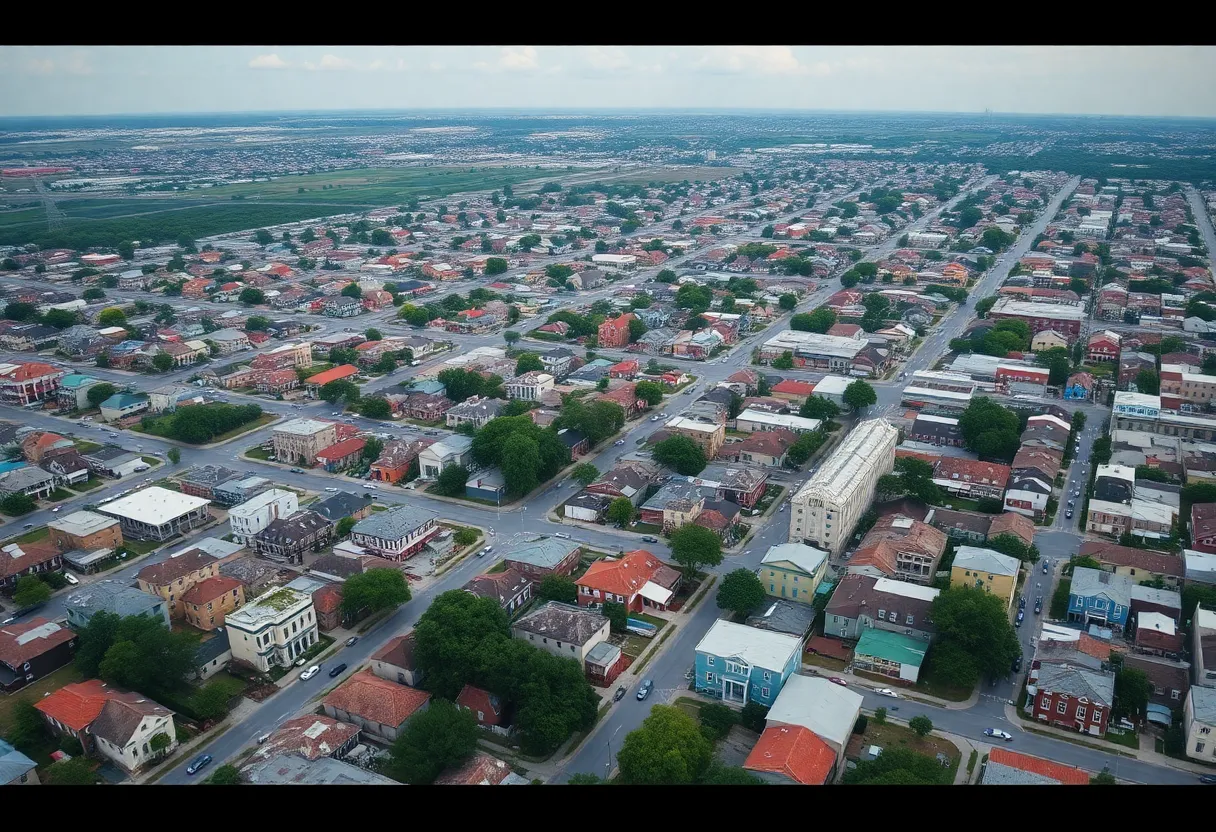News Summary
As New Orleans prepares to commemorate the 20th anniversary of Hurricane Katrina, the city reflects on the lingering impacts of the storm, which left nearly 1,400 dead and over a million displaced. Despite recovery efforts, systemic inequities and gentrification continue to challenge the community, with Black residents facing significant declines in wealth and population. Initiatives addressing economic injustices and community-led recovery efforts are gaining momentum, although significant disparities persist.
New Orleans is marking the 20th anniversary of Hurricane Katrina on August 29, 2025, a catastrophic storm that resulted in nearly 1,400 fatalities and displaced over a million people across Alabama, Louisiana, and Mississippi. The extensive damages from the hurricane exceeded $200 billion, leading to a legacy of inequality and gentrification in the region as recovery efforts continue.
In the aftermath of Hurricane Katrina, New Orleans has experienced significant demographic changes, with the percentage of Black residents decreasing from approximately 67% before the storm to 57% in 2024. This population decline mirrors a broader trend of systemic inequities, as Black households have notably seen stagnation in median income, while their white counterparts have reported gains. Currently, the median net worth for white households in New Orleans stands at around $181,000, compared to a mere $18,000 for Black households, highlighting a stark racial wealth gap.
The recovery narrative surrounding Hurricane Katrina often emphasizes stories of resilience and rebirth, yet it obscures persistent systemic issues such as gentrification and rising homelessness. Census data underscores a significant loss of Black residents—approximately 120,000 since 2000—while the decrease in white residents has been considerably less pronounced. The economic burden has also intensified, with 34% of New Orleanians facing severe cost burdens in 2024, up from 24% in 2004. This situation has left at least 20,000 residents waiting for subsidized housing vouchers, exacerbating the crisis of housing affordability in the city.
Gentrification has disproportionately affected working-class and Black communities, leading to increased living costs in neighborhoods that once offered affordable housing options. Many residents now find themselves grappling with tough choices, such as prioritizing rent payment over essential needs or settling for substandard housing. Furthermore, the trend of housing privatization has favored luxury developments, and many public housing units have been eliminated as a result of market-driven policies.
The support provided by federal relief and protective measures has waned, leaving vulnerable populations more reliant on charitable organizations than on government assistance. This shift has further deepened the inequalities faced by many communities in New Orleans. City leaders often promote a narrative of resilience that ultimately masks the underlying economic and political realities contributing to growing disparity.
Amid these challenges, a noteworthy grassroots initiative has gained traction, focusing on equitable recovery and investing in community-led solutions. The W.K. Kellogg Foundation has pledged over $27 million toward these recovery efforts, emphasizing improvements in areas such as education, healthcare, and food access throughout New Orleans. Despite these philanthropic efforts, the economic landscape remains unevenly distributed across racial lines. While the city’s economy has diversified since Katrina, with growth in sectors like technology and clean energy, this economic expansion has not benefited all residents equally.
In response to ongoing issues of economic injustice, a living wage ordinance has been instituted for city contractors. However, this measure has not extended to the broader workforce, where many individuals continue to earn substandard wages. Additionally, New Orleans’ infrastructure is struggling to adapt to the challenges posed by climate change, with Black neighborhoods especially vulnerable to flooding and lacking sufficient resources to mitigate these risks.
As New Orleans approaches the second decade since Hurricane Katrina, the reality remains that while some progress has been made, significant disparities persist. The city’s journey toward an inclusive and equitable recovery continues to face challenges, requiring concerted efforts from local leaders, community organizations, and residents alike.
Deeper Dive: News & Info About This Topic
HERE Resources
Louisiana Cancels Key Coastal Restoration Project
Today’s Top New Orleans News: What to Know
New Orleans Cultural Attractions: A Local Guide
University of New Orleans Transitions Back to LSU System
Tensions Rise in New Orleans Mayoral Race
Challenges Faced by Latino Workers in New Orleans After Katrina
Fall Performances to Illuminate New Orleans Theaters
Students Make History by Proving Pythagorean Theorem
Multiple Shooting Incidents Under Investigation in New Orleans
New Orleans Saints Face Challenges Ahead of 2025 Season
Additional Resources
- Sac Observer: Katrina at 20 – Race, Wealth, and Recovery
- Inside Philanthropy: 20 Years After Katrina
- WDSU: New Orleans Cantor Reflects on Faith and Recovery
- New York Times: New Orleans Katrina Funds
- Smart Cities Dive: New Orleans Economic Recovery Post-Katrina

Author: STAFF HERE NEWORLEANS WRITER
The NEW ORLEANS STAFF WRITER represents the experienced team at HERENewOrleans.com, your go-to source for actionable local news and information in New Orleans, Orleans Parish, and beyond. Specializing in "news you can use," we cover essential topics like product reviews for personal and business needs, local business directories, politics, real estate trends, neighborhood insights, and state news affecting the area—with deep expertise drawn from years of dedicated reporting and strong community input, including local press releases and business updates. We deliver top reporting on high-value events such as French Quarter Festival, New Orleans Jazz & Heritage Festival, and Essence Music Festival. Our coverage extends to key organizations like the New Orleans Chamber of Commerce and Greater New Orleans, Inc., plus leading businesses in energy, healthcare, and education that power the local economy such as Entergy, Ochsner Health, and Tulane University. As part of the broader HERE network, including HEREShreveport.com, we provide comprehensive, credible insights into Louisiana's dynamic landscape.

